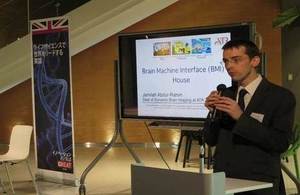UK and Japanese scientists share secrets of the brain
On Monday 18 November the British Consulate-General organised a science café on brain science at the Knowledge Capital innovation centre in Osaka.

British, Japanese and other researchers from around the Kansai region presented a range of subjects from, using the power of thought to control devices in the home, to technologies that can read dreams.
While the topics might sound more like science fiction, research in ground-breaking areas such as these can open up opportunities for valuable application. In particular, understanding how the brain works and how to develop technologies that can interact with it can be useful for dealing with a range of health issues, including assisted living for the elderly, support for disabled people, and the management of psychiatric conditions and pain.
The event was put together with the help of Dr Ben Seymour from the Computational and Biological Learning Lab at the University of Cambridge, currently spending some time at the Center for Information and Neural Networks at the National Institute for Information and Communications Technology in Osaka. Dr Seymour said, “Neural engineering is one of the fastest moving and most exciting areas of science, with the real possibility to develop viable technologies in the foreseeable future. Japan’s strength in technology, and significant recent investment from the government, support a strong scientific environment for research, innovation and technology development. With scientific funding increasingly limited elsewhere in the world, now is a great time to explore opportunities in Japan.”
The event was an opportunity to highlight work done by the UK’s Science & Innovation Team in Japan in recent months to build links between the UK and Japanese neuroscience communities. This has led to a joint UK-Japan call for proposals on imaging for neuroscience which is open until 5 December.
More details can be found at Medical Research Council